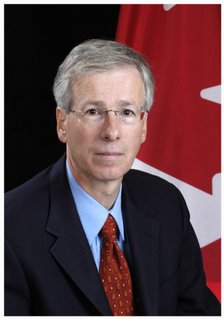The Upside of 2006 and the Down

Keywords: Doug Saunders; war; poverty; population growth; literacy; refugees; AIDS; child labor; Doha round; WTO; agricultural subsidies; tariffs; Democratic Congress; Sylvia Ostry; unilateral liberalization.
If you’re really determined to see 2006 as a great year, you can, though you have to look with your eyes squinting and your head tipped sideways. Doug Saunders managed to do it, with one of his superb columns in the Globe and Mail (p. F3, December 30th).
His trick was to discount Iraq, Afghanistan, Sudan, Somalia, and the Middle East, claiming that in the long term, war is not what the world will remember about the year. Wars these days get a lot of attention, but the ones we have now actually are not big things, and we shouldn’t allow ourselves to be misguided by the amount of attention the press gives them. What really counts are some trends that do not make news.
So what was genuinely worth remembering?
First, there’s the tipping of the world’s economic output back to Asia. For the first time in centuries Asia, led by China and India, has accounted for the larger part of the world’s economic output.
Second, in 2006 for the first time in history, more of the human population was living in cities than in rural areas.
Third, poverty declined everywhere except in sub-Saharan Africa. According to the UN Human Development Report 2007 (released in 2006), “High economic growth in China and India has been the most powerful motor for reducing income poverty.”
Fourth, and because of the reduction of poverty, population growth has dropped in the poor countries. “People in developing countries now have, on average, 2.8 children per family; this is down from 5.8 in 1970. As a result, population growth in the world’s poorer half has slowed to 1.6 per cent each year from 2.1, and the rate of slowdown is increasing.”
Fifth (by my count, since Saunders stopped numbering these items a paragraph or so ago), literacy rates and school enrollment are up.
Sixth, there were fewer refugees than at any time during the past quarter-century.
Seventh, more careful counts of AIDS victims shows that the incidence of that disease is not as bad as previously reported. And besides, there have been places, notably in India, where the crisis is being reduced. HIV infection has declined as a result of education campaigns.
Eighth, child labor has decreased, largely because agriculture has become less dominant in the economy of developing countries, for it is farm children who have had to be employed.
I wouldn’t want to take anything away from Doug Saunders’s report, which is splendidly upbeat and based on sound data. Nor do I particularly like to be downbeat myself, but I will mention one of the darker events of the year here — but only one: the failure of Doha. I think it is important, though it too failed to gain much attention in the press. Most of the cheerful news items that Saunders reports above are not events that happened within a single year, but are long-term trends that could be claimed as accomplishments in any given year. Doha, on the other hand, failed (or is still in the process of failing) in 2006, with consequences that may persist indefinitely.
In July, the director general of the World Trade Organisation (WTO) indefinitely suspended negotiations in the Doha round of trade talks, which were going nowhere. (Indeed, one might say that the WTO itself is going nowhere, but that’s a wider point than I want to make here.)
The purpose of the Doha round, which began in Qatar in 2001, was to avoid further instances of the conflict that had been so apparent in the WTO Seattle meeting. The Doha agenda was development. Until that point, the North-South divide had been increasing, with the South being obviously disadvantaged. In fact, the WTO meeting in Cancun in 2003 had ended in a failure, for the Latin American countries chose no-deal rather than one that ignored their demands regarding agriculture. Several new coalitions of Southern countries formed in Cancun and continued into the subsequent Doha round, which had as its agenda the creation of trade and development policies more favorable to the poor countries.
At the heart of the issue were agricultural subsidies and tariffs. The United States, Australia, and initially Brazil, demanded reductions in tariffs on farm goods, claiming that this would benefit the poor by reducing the price of food and expanding markets for farmers everywhere. Developing countries replied that cheap imports would drive their farmers out of business. They found allies in some developed nations in the EU and Japan, who at the same time demanded cuts in agricultural subsidies. The American payments of subsidies to their own farmers distort prices and unfairly hurt farm producers in the less developed countries (LDCs). The US spends $23 billion dollars a year on subsidies, mainly supporting mega-farms. The poorer countries insist that these subsidies be cut substantially before they will agree to any further liberalization in their own economies. They stand to gain nothing from the Doha round unless its terms are changed.
By July 2006, it was apparent that the two positions were at loggerheads, so the Doha round was suspended. This was a grave failure of the whole multilateral system of negotiations and a severe disappointment to everyone — especially the LDCs. Every such delay imposes huge opportunity costs on them. (According to a World Bank estimate in 2005, global free trade in agriculture would yield gains of US $287 billion, of which $86 billion would go to developing countries.) Almost no one wanted to see Doha fail.
In September, therefore, the WTO director-general sought to re-start the negotiations, though no basic positions had changed. Still, there are compelling reasons for resuming the talks, since the US congress has granted the Bush administration a mandate (“trade promotion authority") to negotiate trade agreements. With it, the administration can submit trade deals to Congress for a yes-or-no vote without the possibility of major amendments. Without this authority, which will expire in mid-2007, the US negotiators would lack credibility. Thus they have only a few months in which to succeed with these revived talks. Of course, if the Congress so chooses, it can extend the trade promotion authority or change its terms.
But in the meantime, the US mid-term elections have taken place, replacing the Republicans with a Democratic majority in both the House and the Senate. The question arises whether the Democrats will want to help the Doha round succeed by extending the administration's mandate. On the one hand, the Democrats make considerable political hay from objecting to the loss of American jobs. However, their overall record is not entirely slanted toward protectionism, so the answer to this question is not clear.
But if Doha is really dead, what then? No one whom I have read sounds happy about it, but the alternatives seem limited. I'll mention only two.
Sylvia Ostry, in the Munk Centre Monitor, would like to see a coalition of middle powers formulate some reforms recognizing the special problems of subsistence agriculture. This body would not be linked to the WTO's rules or negotiation, but would operate with private funding. Such a coalition, says Ostry, "might not create a Brave New World but it should produce something more hopeful than our present Fearful New World."
The alternative approach comes from Razeen Sally: "unilateral liberalization." Sally calls this the “Nike strategy,” for governments
"'just do it.' They liberalize independently and voluntarily outside trade negotiations. Bottom-up unilateral liberalization is patchy and uneven; it is not a total substitute for multilateral rules. But it is the best liberalizing engine on offer. The World Bank estimates that, since the 1980s, about 65 percent of developing-country tariff liberalization has come about unilaterally. This is especially true of east Asia, with China now the pace-setter."
I do not personally have an opinion about these or related options. I simply don't know enough to guess what might work. I'm not even sure how far I want to go with this "liberalization" business. I do believe, however, that it is immensely important to the fate of the planet that protectionist subsidies in the rich countries be curtailed so that producers in poor countries can get ahead and export their products. In that sense, I do not belong to the "anti-globalization" camp.
Nevertheless, there's another element in the equation that has not been mentioned. I doubt that trade of agricultural commodities will continue on the present scale indefinitely. The coming shortage of energy will make it necessary for everyone to consume local products, even if our international rules have been changed to promote free trade.
But that's the story for a different blog, probably a year from now.
Happy 2007, everybody!












